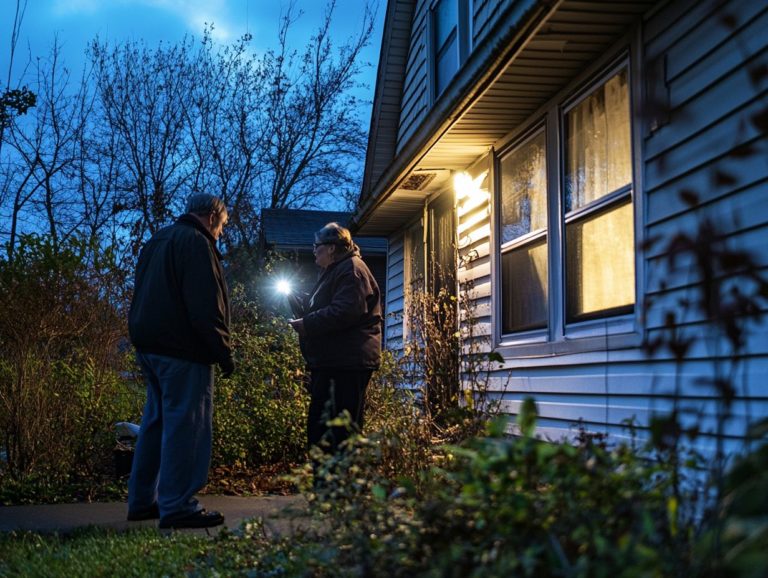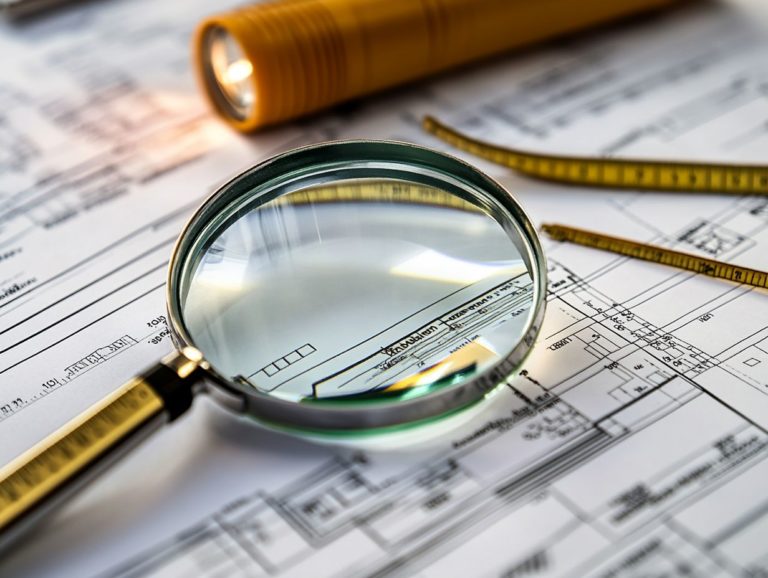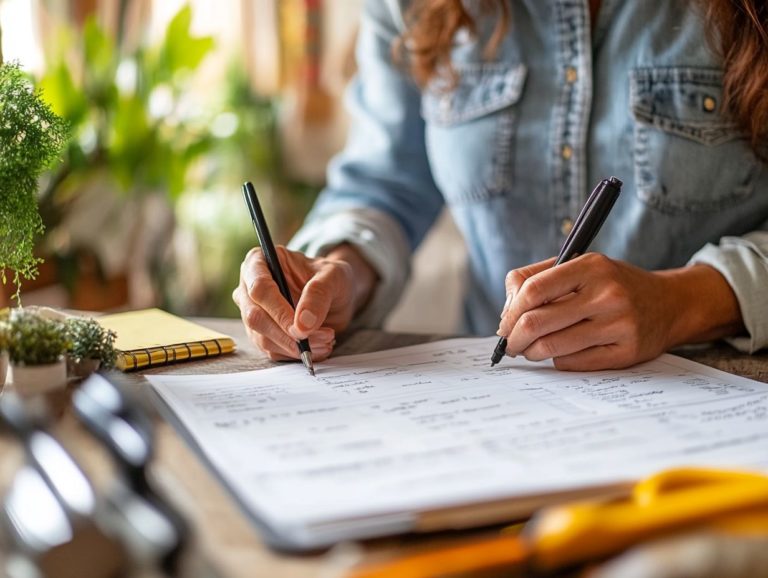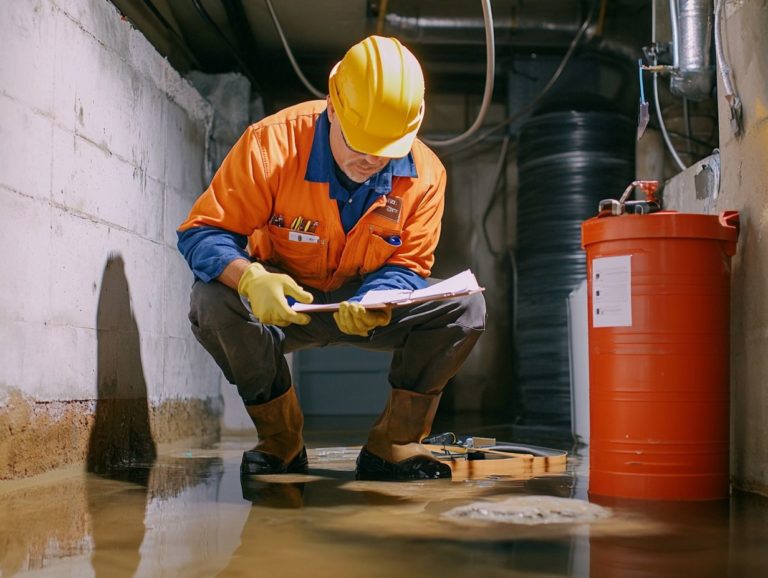How to Stay Calm During a Home Inspection
Preparing for a home inspection may seem daunting, but it doesn t have to be. Don t wait until the last minute! Prepare now to ensure your inspection goes smoothly.
This guide presents essential steps to ensure your experience is seamless, from gathering necessary documents to understanding the purpose of the inspection and managing your expectations.
You ll discover mindfulness techniques that will help you remain calm throughout the process and effective communication strategies for engaging with the inspector. We will also discuss how to handle any issues that come up and outline the next steps to finalize everything.
Whether you re a first-time buyer or a seasoned homeowner, these insights will empower you to navigate the home inspection with confidence.
Contents
- Key Takeaways:
- Preparing for a Home Inspection
- Managing Expectations
- Staying Calm During the Inspection Process
- Addressing Any Issues Found During the Inspection
- Finalizing the Home Inspection Process
- Frequently Asked Questions
- What is a home inspection and why is it important?
- How can I prepare myself mentally for a home inspection?
- What should I do during the actual inspection?
- What if the home inspector finds something wrong with the property?
- How can I stay calm if the home inspector finds major issues?
- What can I do after the home inspection to stay calm?
Key Takeaways:

Be prepared for the home inspection by gathering necessary documents and information beforehand. This helps avoid any last-minute stress.
Understand that the purpose of a home inspection is to identify potential issues, not to find perfection. For a smoother process, consider these tips for a successful home inspection day. Stay calm by practicing mindfulness techniques and communicating effectively with the inspector.
Preparing for a Home Inspection
Preparing for a home inspection is an essential step for you, whether you’re buying or selling a property. This ensures that your home meets the necessary standards set by the National Association of Realtors and Texas regulations.
You’ll want to gather all relevant documents, such as past inspection reports and maintenance records. These can significantly impact both the property’s value and buyer expectations.
By taking this proactive step, you can identify and fix potential issues early, enhancing your home s curb appeal and paving the way for a smoother transaction.
Gathering Necessary Documents and Information
Gathering the necessary documents and information is crucial for you as both a seller and a home buyer to feel confident during the home inspection.
When you’re aiming for a smooth transaction, having previous inspection reports at your fingertips can uncover potential issues that might easily slip through the cracks. Repair receipts offer valuable insight into the property’s maintenance history, instilling confidence in you as a buyer regarding the home s condition.
Maintenance records can highlight regular upkeep, which not only enhances property value but also makes the home more appealing to prospective buyers. These documents serve as vital evidence during negotiations, enabling you as a seller to justify your asking price.
This approach streamlines the entire process, ultimately creating a more favorable outcome for everyone involved.
Managing Expectations
Managing expectations during a home inspection is crucial for you as both a home buyer and seller. It ensures that everyone is on the same page regarding what to expect from the inspection findings and any potential concerns from buyers.
This alignment becomes particularly important when you factor in the inspection contingency, which can significantly impact the negotiation process and ultimately influence the sale price.
Understanding the Purpose of a Home Inspection

Understanding the purpose of a home inspection is essential for you, whether you re buying or selling, as it highlights the significance of the inspection report in the real estate transaction process.
This evaluation checks how well the property is built and if everything is working properly. Inspectors will meticulously examine key components such as HVAC systems, plumbing, and electrical installations to ensure everything is functioning effectively and safely.
By offering a detailed analysis of these mechanical systems, the inspection helps you pinpoint potential issues that may lead to costly repairs down the road. This comprehensive assessment not only informs you about the current state of the home but also enables you to make informed decisions regarding your investment.
Ultimately, a thorough home inspection fosters transparency, enabling smoother negotiations and boosting your confidence in the purchase.
Get started today to make your home inspection a breeze!
Staying Calm During the Inspection Process
Maintaining a sense of calm during the inspection process is crucial for both buyers and sellers. It creates a positive environment that enhances communication and deepens understanding of the inspection report.
Acknowledging that the findings might uncover issues requiring home repairs or adjustments in the selling price can reduce stress. This encourages meaningful discussions and transforms a potentially tense situation into an opportunity for working together.
Practicing Mindfulness Techniques
Practicing mindfulness techniques can significantly enhance the experience for both buyers and sellers during the home inspection process. These techniques foster calmness and alleviate anxiety.
By incorporating specific strategies such as deep breathing, visualization, and grounding exercises, you can sharpen your focus and maintain a sense of relaxation.
For example, deep breathing enables you to center your thoughts, effectively easing the stress that often accompanies inspections. Visualization techniques allow you to picture your future in a potential home, cultivating a sense of belonging and comfort.
Engaging in grounding exercises, like feeling the texture of a nearby object, can help you manage rising concerns. This creates a more positive atmosphere.
By implementing these techniques, you address any apprehensions and contribute to a smoother and more enjoyable inspection experience for everyone involved.
Communicating Effectively with the Inspector
Effective communication with the inspector is essential during the home inspection process. It provides you with a clear understanding of the inspection findings and the inspector’s qualifications.
By actively engaging in discussions and asking insightful questions, you can clarify any uncertainties about potential concerns or repairs noted in the report. This dialogue not only promotes working together but also enables you to make informed decisions about your property.
When both you and the inspector feel comfortable communicating, it creates a positive environment that can reveal hidden issues. Ultimately, this leads to better negotiation outcomes and a healthier relationship between homebuyers and sellers.
Addressing Any Issues Found During the Inspection

Addressing any issues uncovered during the inspection is vital for both buyers and sellers. It significantly influences the negotiation process, repair costs, and the overall success of the transaction.
Grasping how to prioritize inspection findings and determining the most suitable responses can ultimately shape the outcome of the sale.
Prioritizing and Negotiating Repairs
Prioritizing and negotiating repairs after a home inspection is a crucial step in finalizing your transaction. It ensures that both you and the seller are aligned on repair costs and expectations.
Understanding which repairs are essential versus those that can be postponed requires careful thought about safety, functionality, and overall value. For instance, a leaky roof or faulty electrical wiring demands immediate attention, while cosmetic updates like paint touch-ups can often wait.
Utilizing smart negotiation tactics, such as presenting repair estimates from contractors, helps clarify the financial implications for both you and the seller. Keeping the lines of communication open significantly enhances the buyer-seller relationship, fostering a sense of trust and cooperation.
This collaborative approach leads to solutions that make both parties feel heard and valued during discussions about home repairs.
Finalizing the Home Inspection Process
Ready to seal the deal? Finalizing your home inspection is crucial. It entails a series of steps that you, whether a home buyer or seller, should diligently follow to ensure a seamless transition to the next phase of your transaction.
This involves carefully reviewing the inspection report, addressing any lingering concerns, and determining the subsequent steps and follow-up tasks that will pave the way for a successful sale.
Take these steps seriously to ensure a smooth transition!
Next Steps and Follow-up Tasks
Understanding the next steps and follow-up tasks after receiving the inspection report is key for home buyers and sellers. This knowledge helps you navigate the closing process with confidence.
This awareness enables you to effectively address any identified issues. It is crucial to prioritize contacting repair services for significant repairs.
Once you determine the scope of work, it’s essential to talk about the final details that accurately reflect these findings. This may lead to adjustments in the sale price.
Maintaining clear communication with everyone involved real estate agents, lenders, and even the repair teams ensures a streamlined process. Timely updates and open discussions will cultivate trust and keep all parties aligned, ultimately paving the way for a successful closing experience.
Frequently Asked Questions

What is a home inspection and why is it important?
A home inspection is a thorough examination of a property’s condition, typically done before buying or selling a home. It’s important because it helps identify any potential issues or repairs that may need to be addressed.
How can I prepare myself mentally for a home inspection?
First, remind yourself that a home inspection is a normal part of the home buying process. To help you prepare, consider checking out what to expect during a home inspection. Take some deep breaths and try to focus on the positive aspects of the home. You can also write down any questions or concerns you have beforehand to discuss with the inspector.
What should I do during the actual inspection?
During the home inspection, try to remain calm and follow along with the inspector. Take notes and ask questions if needed, but avoid getting in the way or distracting the inspector. After the inspection, knowing what to do next can be crucial, so if possible, bring a friend or family member for support.
What if the home inspector finds something wrong with the property?
It is crucial to remember that no home is perfect and there may be some issues found during the inspection. If the issues are minor, you can discuss with the seller about addressing them. If there are major concerns, you may request a professional to further assess the situation.
How can I stay calm if the home inspector finds major issues?
If the home inspector does find major issues, take a deep breath and try not to panic. It’s important to keep a level head and discuss the situation with your real estate agent and possibly a professional contractor. They can provide guidance on how to move forward with the purchase or negotiate repairs with the seller.
What can I do after the home inspection to stay calm?
After the home inspection, take some time to review the report and discuss any concerns with your real estate agent. They can help you determine the best course of action and provide support and guidance throughout the buying process.
If you have further questions, don’t hesitate to contact your real estate agent for assistance!






